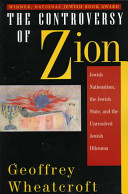
The Controversy of Zion PDF
396 Pages·1997·15.8029 MB·other
Most books are stored in the elastic cloud where traffic is expensive. For this reason, we have a limit on daily download.
Preview The Controversy of Zion
Description:
After centuries of persecution and contempt, European Jews were slowly
emancipated in the nineteenth century. This gave them a chance to become
what they were never allowed to be before; loyal citizens of the
countries where they lived. As the nineteenth century wore on, however,
this emancipation proved to be an illusion. The hatred once based on
religion made way for a new and more insidious form of anti-Semitism
based on race and culture. The Jew was still a stranger, his position
the more false and humiliating for his attempt to assimilate. This was
the Jewish Question, to which, at the end of the nineteenth century, a
drastic solution was proposed. In 1896, Viennese journalist Theodore
Herzl first coined the term "Zionism, " for a movement to found a
homeland where Jews could live free from his persecution. In The
Controversy of Zion, Wheatcroft shows how Zionism, proposed as an
answer, has instead raised many questions. He examines in detail the
debates over Jewish nationalism, from the time of Herzl through Prime
Minister Yitzhak Rabin's assassination in 1995, introducing a host of
extraordinary characters: Disraeli and Marx; the early Zionists Hess and
Herzl; Jewish writers such as Karl Kraus; anti-Semites such as Belloc;
military Zionists such as Jabotinsky; and noble-spirited teachers such
as Judah Magnes. Today there is a Jewish state which is a source of
healing pride for millions of Jews, but also a source of anxiety. Should
they defend the religious zealots and right-wing settlers who play an
ever larger part in Israeli life? Or is Israel increasingly irrelevant
to the fabulous success story of the Jews of America? This engaging and
original book illuminates the current conflicts in the Middle East, and
the continuing Jewish dilemma.
See more
The list of books you might like
Most books are stored in the elastic cloud where traffic is expensive. For this reason, we have a limit on daily download.
